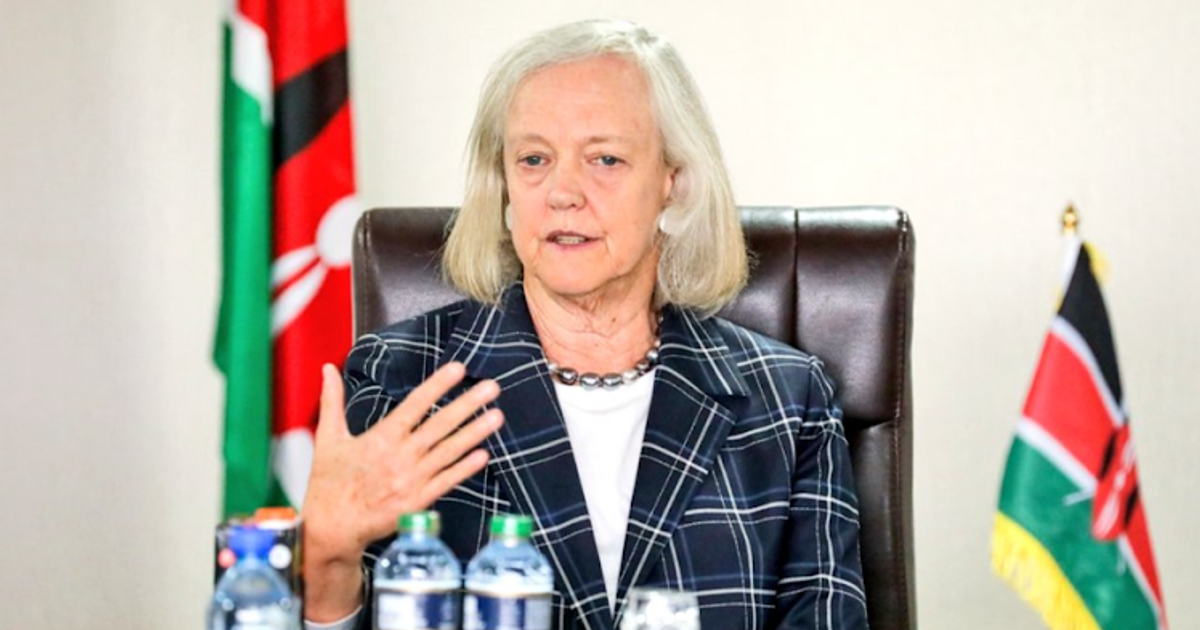- Following Donald Trump's return to the presidency, her departure has ignited a firestorm of debate about the role of diplomacy in an increasingly polarized world.
- Particularly contentious was Whitman's perceived silence during the Gen Z protests in June, where Western diplomatic missions were criticized for their delayed response to violence.
Meg Whitman's resignation as U.S. Ambassador to Kenya marks a pivotal moment in the complex tapestry of U.S-Kenya relations. Following Donald Trump's return to the presidency, her departure has ignited a firestorm of debate about the role of diplomacy in an increasingly polarized world.
Whitman's tenure was characterized by a laser focus on economic ties, yielding impressive results in trade and investment. Her "Why Africa, Why Kenya?" initiative successfully attracted American companies, leading to historic highs in U.S. investment in Kenya. She also played a crucial role in elevating Kenya to the status of a major non-NATO ally in sub-Saharan Africa, a significant diplomatic achievement.
However, controversies surrounding her approach to human rights and governance issues overshadow Whitman's economic successes. Critics accused her of turning a blind eye to alleged abuses and aligning too closely with President William Ruto's administration. The tension between promoting economic interests and upholding democratic values became a defining challenge of her tenure.
Particularly contentious was Whitman's perceived silence during the Gen Z protests in June, where Western diplomatic missions were criticized for their delayed response to violence. This incident highlighted the delicate balance diplomats must strike between maintaining positive relations with host governments and advocating for human rights and democratic principles.
Opposition leader Raila Odinga's relationship with Whitman was notably tumultuous. At one point, Odinga described her as a 'rogue ambassador,' accusing her of overstepping diplomatic boundaries and interfering in Kenya's internal affairs. This characterization reflected the deep-seated concerns among some Kenyans about the extent of U.S. influence in their country's politics.
Read More
However, the relationship between Odinga and Whitman later showed improvement, as evidenced by their joint appearances at public events, suggesting a complex and evolving dynamic between the opposition and the U.S. diplomatic presence.
Whitman's resignation amid calls for her recall on social media underscores the growing influence of public opinion on diplomatic affairs. The hashtag #RecallMegWhitman trended on X (formerly Twitter), reflecting the frustration of some Kenyans with her perceived bias and lack of action on human rights issues.
As Kenya grapples with its own political and economic challenges, including concerns about democratic backsliding and economic inequality, the role of the U.S. ambassador becomes even more critical. The incoming envoy will need to navigate these complex issues while maintaining the economic momentum initiated by Whitman.
The transition period, led by Chargé d'Affaires Marc Dillard, will be crucial in maintaining the continuity of U.S.-Kenya relations. It also provides an opportunity for reflection on the broader goals of U.S. foreign policy in Africa under the new Trump administration.
Whitman's mixed legacy offers valuable lessons for future diplomats. It highlights the need for a more balanced approach that promotes economic interests while robustly defending democratic values and human rights. Clear and consistent communication on sensitive political issues and navigating domestic politics while representing U.S. interests will be crucial skills for her successor.
As both countries look to the future, the experiences of Whitman's tenure will undoubtedly shape the evolving partnership between the United States and Kenya. The next ambassador will face the challenge of building on Whitman's economic achievements while addressing the criticisms that marked her time in office.
This transition comes at a critical juncture for both nations. As they navigate complex global challenges, from climate change to regional security threats, the strength of the U.S.-Kenya partnership will be more important than ever.
The next chapter in this relationship will require a delicate balance of economic pragmatism and unwavering commitment to shared democratic values while also being mindful of the diverse political landscape in Kenya, including the perspectives of opposition leaders like Raila Odinga.


-1769608133-md.jpg)



-1769608133-sm.jpg)


